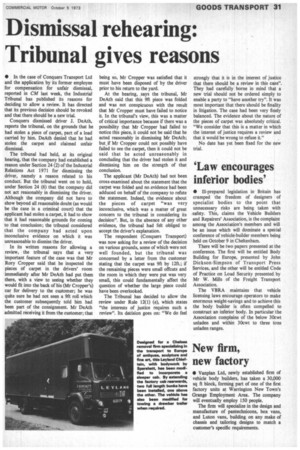Dismissal rehearing: Tribunal gives reasons
Page 33

If you've noticed an error in this article please click here to report it so we can fix it.
• In the case of Conquers Transport Ltd and the application by its former employee for compensation for unfair dismissal, reported in CM last week, the Industrial Tribunal has published its reasons for deciding to allow a review. It has directed that its previous decision should be revoked and that there should be a new trial.
Conquers dismissed driver J. DeAth, reports the tribunal, on the grounds that he had stolen a piece of carpet, part of a load carried by him. DeAth denied that he had stolen the carpet and claimed unfair dismissal.
Thetribunal had held, at its original hearing, that the company had established a reason under Section 24 (2) of the Industrial Relations Act 1971 for dismissing the driver, namely a reason related to his conduct. But the tribunal went on to hold, under Section 24 (6) that the company did not act reasonably in dismissing the driver. Although the company did not have to show beyond all reasonable doubt (as would be the case in a criminal court) that the applicant had stolen a carpet, it had to show that it had reasonable grounds for coming to that conclusion; the tribunal considered that the company had acted upon inconclusive evidence on which it was unreasonable to dismiss the driver.
In its written reasons for allowing a review, the tribunal says that a very important feature of the case was that Mr Rory Cropper said that he inspected the pieces of carpet in the drivers' room immediately after Mr DeAth had put them there, with a view to seeing whether they would fit into the back of his (Mr Cropper's) car for delivery to the customer; he was quite sure he had not seen a 9ft roll which the customer subsequently told him had been part of the consignment. Mr DeAth admitted receiving it from the customer; that being so, Mr Cropper was satisfied that it must have been disposed of by the driver prior to his return to the yard.
At the hearing, .says the tribunal, Mr DeAth said that this 9ft piece was folded and was not conspicuous with the result that Mr Cropper must have failed to notice it. In the tribunal's view, this was a matter of critical importance because if there was a possibility that Mr Cropper had failed to notice this piece, it could not be said that he acted reasonably in dismissing Mr DeAth; but if Mr Cropper could not possibly have failed to see the carpet, then it could not be said that he acted unreasonably in concluding that the driver had stolen it and dismissing him on the strength of that conclusion.
The applicant (Mr DeAth) had not been cross-examined about the statement that the carpet was folded and no.evidence had been adduced on behalf of the company to refute the statement. Indeed, the evidence about the pieces of carpet "was very inconclusive, which was a matter of great concern to the tribunal in considering its decision". But, in the absence of any other evidence, the tribunal had felt obliged to accept the driver's explanation.
The respondent (Conquers Transport) was now asking for a review of the decision on various grounds, some of which were not well founded, but the tribunal was concerned by a letter from the customer stating that the carpet was 9ft by 12ft.; if the remaining pieces were small offcuts and the room in which they were put was very small, this could fundamentally affect the question of whether the large piece could have been overlooked.
The Tribunal has decided to allow the review under Rule 12(1) (e), which states "the interests of justice requires such a review". Its decision goes on: "We do feel strongly that it is in the interest of justice that there should be a review in this case". They had carefully borne in mind that a new trial should not be ordered simply to enable a party to "have another try". It was most important that there should be finality in litigation. The case had been very finely balanced. The evidence about the nature of the pieces of carpet was absolutely critical. "We consider that this is a matter in which the interest of justice requires a review and that it would be wrong to refuse it."
No date has yet been fixed for the new trial.
















































































































































